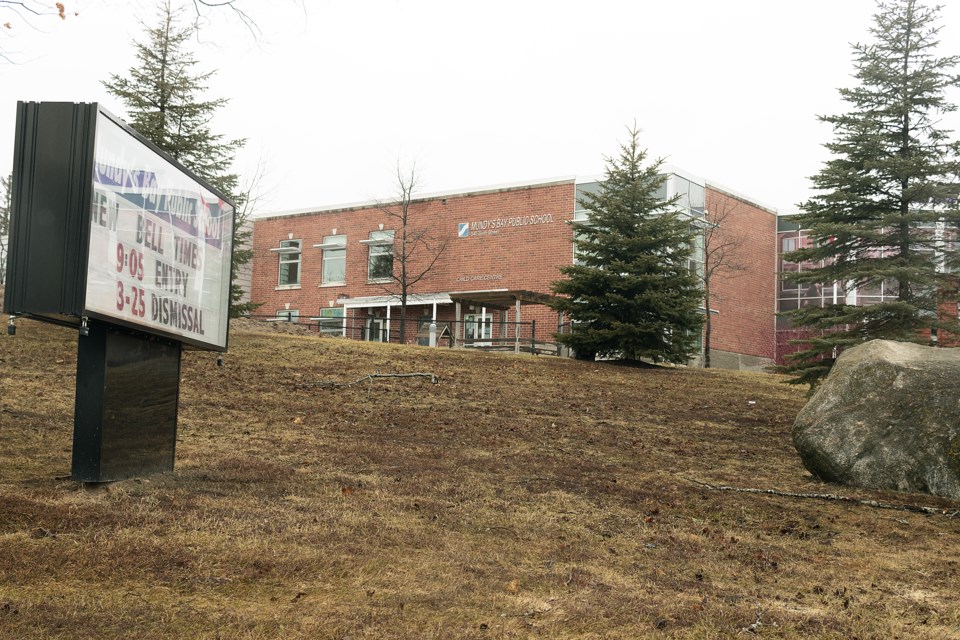The west side of Yonge Street is getting prepared for an overhaul as the next major project in Midland, and how its surface gets painted was the topic at the recent committee of the whole meeting.
A public meeting was held in October for residents to learn more and complete a survey for their suggestions regarding travel lanes, turning lanes, cycling lanes, and/or a multi-use trail among other options.
Environment and infrastructure staff brought a report to this week’s council meeting, recommending an option that would incorporate a buffer of flexible bollards from CR-93 to King Street between vehicle lanes and the cyclists and pedestrians, maintaining the single lanes for vehicles with a central turning lane.
Mundy’s Bay Public School is located on Yonge Street between Sixth and Seventh Street. Their response through their Simcoe Muskoka District Health Unit-led On the Move committee was for the second option, aligning with the staff recommendation.
Mayor Bill Gordon thanked staff for the report, but said there was a missed option not provided to residents: a return to the way things were.
“The ironic thing is that what most people wanted, of the options presented to them, of course, was status quo,” said Gordon. “As it turns out though, that doesn’t work with the MTO. It kind of did before when we winged it, but we can't now and we need some kind of delineation for the cyclists and we can’t just have paint.”
His suggested amendment to the report recommendations was to send the report back for staff to explore the cost to have four lanes – two lanes in either direction – and keep children under 12 legally on the sidewalks while adult cyclists use a road lane.
“The rationale here is, we only have two main east-west corridors; there’s Hugel Avenue and there’s Yonge Street,” said Gordon. “Yonge is our truck route, it is our main arterial road… through our town.”
He added that the parallel Hugel Avenue had two lanes of traffic with painted delineation for cyclists, and although steeper, would be accessible for those wanting a cycling challenge.
As Gordon was amending the motion for increased options, Coun. Jamie-Lee Ball also sought a further amendment. Redesign options of the intersection at Fourth Street – a street cited as a hazardous speeding zone by residents – were explored but with proposed multi-use lanes ceasing at that intersection; Ball requested staff to look into extending those lanes from CR-93 to King Street.
Providing a cost-analysis for the project was engineering manager Mitch Sobil, who shared that the estimated base cost for the reconstruction project would be $8.5 million, covering option one of status quo.
The staff and school recommended second option for flexible bollards would be an additional $500,000; a third option to create a multi-use trail from CR-93 to Eighth Street would raise the cost another $500,000 to $9.5 million; and Ball’s suggested amendment option for full extension would be around the $11 million range or more, according to Sobil.
Coun. Catherine MacDonald asked if four lanes were a feasible option, to which Sobil confirmed was possible but due to the narrow width of Yonge Street it would be a challenge due to constraints and existing utilities.
As Gordon asked if staff could bring back a report which would address not only the amended options but also consideration for anticipated population growth along the corridor, Sobil replied that a Yonge Street road diet report from 2017 had made those calculations and that the town was in line with the report through to 2041.
While Gordon expressed assurance that re-examining painted lines wouldn’t be a great impact on the project’s cost or timeline, Sobil responded with caution that reconstruction could potentially be delayed as staff revisit further options.
The motion was split in two parts, with Gordon and Ball’s amendments approved as the first half.
Regarding Fourth Street, residents had previously asked council to consider making it a one-way route to decrease traffic issues. As part of the report, staff had explored options but recommended upgrading to a permanent signal at the intersection of Yonge Street and removing its pedestrian crossing option, but otherwise leave the street as is. Gordon commented that it wasn’t a slight against resident concerns but that the traffic data didn’t align with their claims of speeding.
Information on the Yonge Street project, timelines, scope, and reports are available on the construction page of the town website.
The Yonge St. reconstruction bike lanes report, including options and survey results, is available in the council agenda on the town of Midland website.
Council meetings are held every third Wednesday, and can be viewed on Rogers TV cable channel 53 when available, or through the livestream on the Rogers TV website. Archives of council meetings are available through Rogers TV and on the Town of Midland’s YouTube channel.
